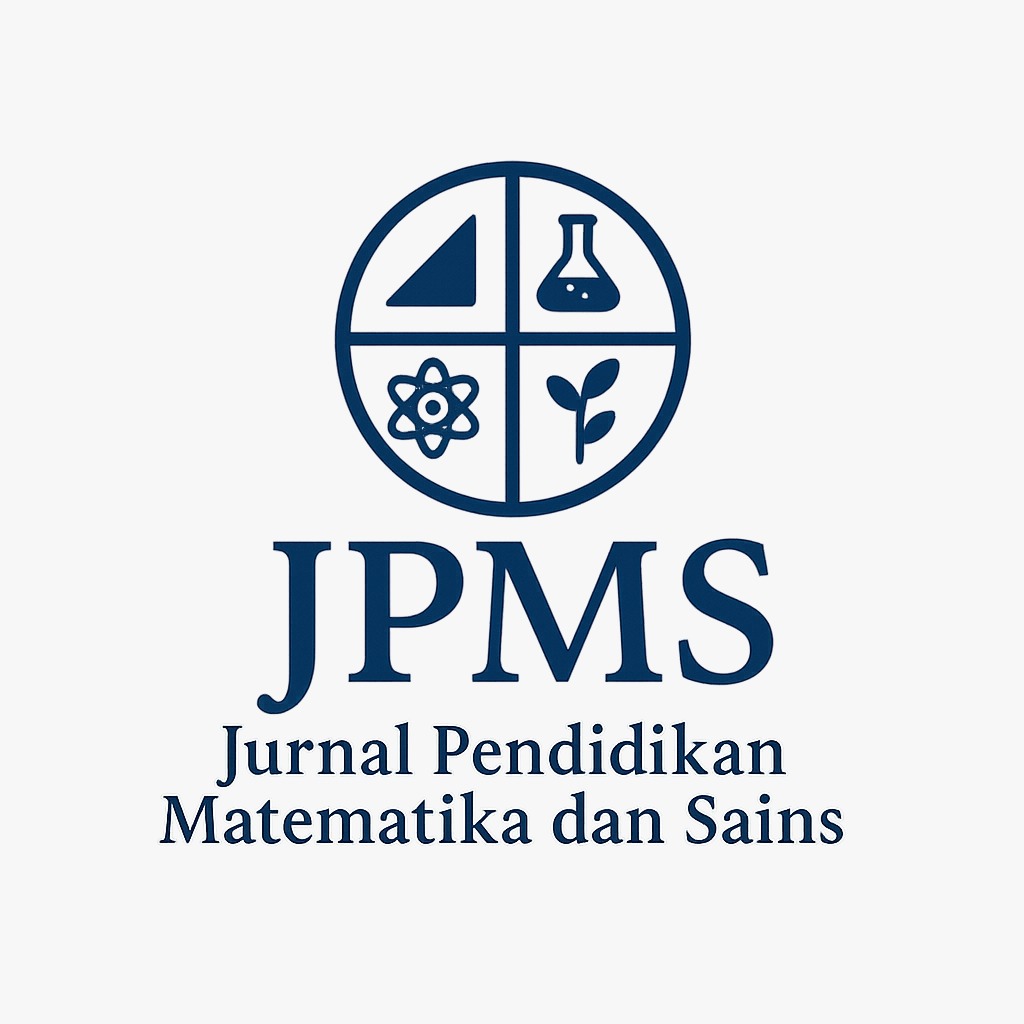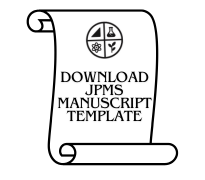Students' Mathematical Reflective Thinking Ability with Guided Discovery Learning on Pythagorean Theorem Material
DOI:
https://doi.org/10.21831/jpms.v13i1.84650Keywords:
Effect, Guided Discovery Learning, Mathematical Reflective Thinking SkillsAbstract
This study aims to determine the effect of the guided discovery learning model on students' mathematical reflective thinking ability. The population in this study were all 8th grade students in one of the schools in Lampung in the 2024/2025 academic year as many as 287 students distributed into 9 classes. The sample in this study took two classes totaling 29 and 27 students respectively which were selected using a cluster random sampling technique. The design used was posttest only control group design. The data collection technique used was a test technique with an instrument in the form of a 4-item mathematical reflective thinking ability test question sheet. Based on the results of the normality test and homogeneity test, it was found that the posttest data from the two groups were normally distributed and homogeneous. Furthermore, the hypothesis test using the independent sample t-test test showed that the mathematical reflective thinking ability of students who followed the guided discovery learning model was higher than the mathematical reflective thinking ability of students who followed the direct instruction model. Therefore, it can be concluded that the guided discovery learning model affects students' mathematical reflective thinking ability.
References
Adelia, R., Noer, S. H., & Gunowibowo, P. (2019). Efektivitas guided discovery learning ditinjau dari kemampuan berpikir reflektif dan self confidence. Jurnal Pendidikan Matematika Unila, 7(1), 132–145.
Aini, N., & Kurniasari, I. (2021). Analisis kemampuan dan disposisi berpikir reflektif matematis siswa ditinjau dari perbedaan jenis kelamin. MATHEDUNESA Jurnal Ilmiah Pendidikan Matematika, 39, 350-363.
Aminah, S., & Rohayati, A. (2021). Analisis kemampuan berpikir tingkat tinggi siswa SMP dalam menyelesaikan soal HOTS geometri berdasarkan prestasi belajar. Pelita : Jurnal Penelitian Dan Karya Ilmiah, 21(1), 140–151.
Andrean, N. J., Noer, S. H., & Asmiati. (2019). Pengembangan pembelajaran penemuan terbimbing untuk meningkatkan kemampuan berpikir reflektif dan kemandirian belajar siswa. AKSIOMA: Jurnal Program Studi Pendidikan Matematika, 8(2), 270–278.
Anwar, & Sofiyan. (2018). Teoritik tentang berpikir reflektif siswa dalam pengajuan masalah matematis. Jurnal Numeracy, 5(1), 91–101.
Ariyana, Y., Pudjiastuti, A., Bestina, D., & Rusman. (2018). Model-model pembelajaran inovatif. Jakarta: Direktorat Pembinaan Guru Pendidikan Dasar, Direktorat Jenderal Guru dan Tenaga Kependidikan, Kementerian Pendidikan dan Kebudayaan.
Ashari, V. F., Jihad, A., & Rachmawati, T. K. (2024). Peningkatan kemampuan berpikir reflektif matematis melalui model pembelajaran Connected Mathematics Project (CMP). Jurnal Analisa, 10(1), 64–75.
Isnurani. (2018). Pengembangan kemampuan penalaran matematis siswa melalui pembelajaran berbasis multi representasi di SMP. Jurnal Saintika UNPAM, 1(1), 20–34.
Juhaevah, F. (2017). Profil kemampuan berpikir reflektif siswa SMP dalam memecahkan masalah matematika standar PISA ditinjau dari perbedaan gender. Jurnal Matematika Dan Pembelajaran, 5(2), 221–236.
Junaedi, Y., Maryam, S., & Lutfi, M. K. (2022). Analisis kemampuan berpikir reflektif siswa SMP pada pembelajaran daring. Journal of Mathematics Education and Learning, 2(1), 49–56.
Kartikasari, L., & Kurniasari, I. (2021). Profil berpikir reflektif siswa SMP dalam menyelesaikan soal PISA ditinjau dari kecemasan matematika. Jurnal Cendekia: Jurnal Pendidikan Matematika, 5(3), 2878–2895.
Kurniasari, I., & Fauziah, H. N. (2022). Model pembelajaran creative problem solving (CPS) berbasis socioscientific untuk meningkatkan kemampuan berpikir reflektif peserta didik. Jurnal Tadris IPA Indonesia, 2(3), 272–282.
Marfu’ah, S., Zaenuri, Z., Masrukan, M., dan Walid, W. (2022). Model pembelajaran matematika untuk meningkatkan kemampuan penalaran matematis siswa. PRISMA, Prosiding Seminar Nasional Matematika, 5, 50-54.
Marlina, R., & Budayasa, K. (2020). Pengaruh pembelajaran penemuan terbimbing terhadap kemampuan pemecahan masalah dan berpikir reflektif siswa. Jurnal Pendidikan dan Pembelajaran Matematika, 3(1), 45–54.
Ningrum, A. A., & Fauziah, H. N. (2021). Analisis kemampuan berfikir reflektif dalam menyelesaikan permasalahan berbasis isu sosial ilmiah ditinjau dari perbedaan gender. Jurnal Tadris IPA Indonesia, 1(2), 87–98.
Noer, S. H. (2018). Guided discovery model: An alternative to enhance students’ critical thinking skills and critical thinking dispositions. Jurnal Riset Pendidikan Matematika, 5(1), 108–115.
Nuriadin, I., Kusumah, Y. S., Sabandar, J., & Dahlan, J. A. (2015). Enhancing of students’ mathematical reflective thinking ability through knowledge sharing learning strategy in senior high school. International Journal of Education and Research, 3(9), 255-268.
OECD (2023), PISA 2022 results (Volume I): The state of learning and equity in education. OECD Publishing. https://doi.org/10.1787/53f23881-en.
Pradana, A. B., Hidayanto, E., Budiono, E., & Cahyowati, E. T. D. (2024). Penerapan guided discovery learning berbantuan Fast Track untuk mengembangkan kemampuan berpikir reflektif. Jurnal Kajian Pendidikan Indonesia (JKPI), 1(1), 23–33.
Rachmat, Nindiasari, H., & Fathurrohman, M. (2020). Pengaruh model pembelajaran kooperatif tipe Teams Games Tournament (TGT) terhadap kemampuan berpikir reflektif matematis ditinjau dari gaya kognitif. Uninus Journal Published, 5(1), 46–54.
Ramadhani, N. F., & Aini, I. N. (2019). Kemampuan berpikir reflektif matematis siswa dalam menyelesaikan masalah yang berkaitan dengan bangun ruang sisi datar. Prosiding Seminar Nasional Matematika Dan Pendidikan Matematika, 1(1), 754–761.
Riswadi, M. L., & Adirakasiwi, A. G. (2023). Proses berpikir reflektif matematis siswa dalam menyelesaikan soal bangun ruang berdasarkan gender. Jurnal Cendekia: Jurnal Pendidikan Matematika, 7(3), 2420–2429.
Sari, E. Y., & Noer, S. H. (2015). Guided discovery learning dalam pembelajaran matematika. Seminar Nasional Matematika Dan Pendidikan Matematika UNY, 891-896.
Sari, P. A., & Widodo, S. A. (2023). Implementasi discovery learning untuk meningkatkan kemampuan berpikir tingkat tinggi dan reflektif siswa. Jurnal Inovasi Pendidikan, 18(3), 203–212.
Sihaloho, R., & Zulkarnaen, R. (2019). Studi kasus kemampuan berpikir reflektif matematis siswa SMA. Prosiding Seminar Nasional Matematika Dan Pendidikan Matematika, 1(1), 736–741.
Susanti, H., & Pratiwi, M. (2022). Efektivitas LKPD berbasis guided discovery untuk meningkatkan kemampuan berpikir reflektif. Jurnal Pendidikan Matematika dan Sains, 10(1), 30–38.
Winangun, I. M., Wiguna, I. K., & Tristaningrat, M. A. (2021). Model guided discovery learning berorientasi pembelajaran abad 21 bermuatan Tri Kaya Parisudha. Jurnal Mimbar Ilmu, 26(3), 355-363.
Yuliani, K., & Saragih, S. (2015). The development of learning devices based guided discovery model to improve understanding concept and critical thinking mathematically ability of students at Islamic junior high school. Journal of Education and Practice, 6(24), 116–128.
Downloads
Published
How to Cite
Issue
Section
Citation Check
License
Copyright (c) 2025 Jurnal Pendidikan Matematika dan Sains

This work is licensed under a Creative Commons Attribution-ShareAlike 4.0 International License.
Jurnal Pendidikan Matematika dan Sains allows readers to read, download, copy, distribute, print, search, or link to its articles' full texts and allows readers to use them for any other lawful purpose. The journal allows the author(s) to hold the copyright without restrictions. Finally, the journal allows the author(s) to retain publishing rights without restrictions
- Authors are allowed to archive their submitted article in an open access repository
- Authors are allowed to archive the final published article in an open access repository with an acknowledgment of its initial publication in this journal

This work is licensed under a Creative Commons Attribution-ShareAlike 4.0 Generic License.





